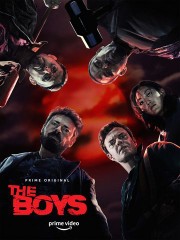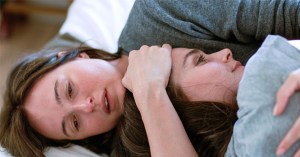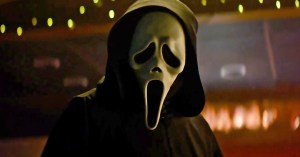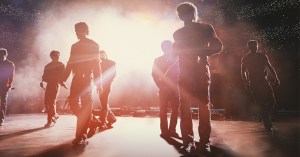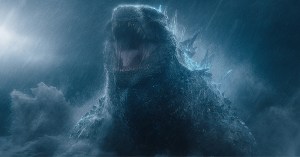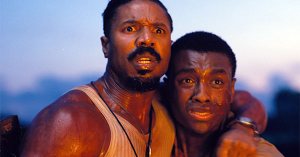Dark Humor Propels The Boys, But Cast and Producers Spotlight Humanity Behind the Superhero Tale
The series may be chock-full of foul language and dark deeds, but “I think the story’s actually very sweet,” executive producer and showrunner Eric Kripke tells Rotten Tomatoes.
Funny new superhero series The Boys definitely has a dark side. The show’s entire premise takes a look at the seedier side of superheroes existing in a world closer to our own. But where other comic books, like Watchmen, considered superpowers as a geopolitical element, the comic series by Garth Ennis and Darick Robertson takes the notion of “grounded” superheroes into far more realistic territory.
At Comic-Con International: San Diego last week, The Boys executive producer and showrunner Eric Kripke put it simply in recalling a conversation with Ennis: “When I had a dinner with Garth in 2015, I asked him what inspired him to write The Boys, and he said, ‘I wanted to see what happens when the worst of celebrity was married with superheroes.’”
“As a celebrity, I related to that,” joked fellow executive producer Seth Rogen, who also produced Preacher, the other Garth Ennis comic to make its way to television.
The Amazon Prime Video series revolves around five (mostly) non-powered people who take it upon themselves to police superheroes.
“They’re the little guy — the blue collar 99 percent,” Kripke explained. “They’ve been f—ed over by these tectonic plates. They’re ground down by these people who don’t give them another thought.”
The Boys are led by Billy Butcher (Karl Urban) a man whose vendetta against the world’s leading superhero team, The Seven, saw the end of his organization sometime before the series begins. But when Hughie’s (Jack Quaid) girlfriend is killed by the speedster A-Train (Jessie T. Usher), Butcher sees an opportunity to get the band back together.
“They’re like ‘chalk and cheese,’” Urban said of the characters. The expression — which confused the American members of the cast during the panel — is better known in New Zealand and refers to superficially similar, but fundamentally different things. An apt description of the lead characters. “[But] he can manipulate this kid to do something really dangerous,” Urban continued.
When Rotten Tomatoes spoke with Urban and Quaid earlier this year, Quaid expressed that the “chalk and cheese” nature of Hughie and Butcher quickly gives way to a rapport Butcher does not expect.
“[He] recognizes something in Hughie that reminds him of his brother who also tragically passed away when he was a child,” Quaid said, referring to events in the comic that may or may not be represented in the television series, but that still informed their approach to the relationship.
“You have this sort of almost parental, but definitely brotherly kind of relationship that starts to form between them,” Quaid said.
But that brotherly dynamic is always informed by Butcher’s thirst for revenge against a key member of The Seven. It would, in fact, also lead Hughie into that darkness if not for a literal source of light: Annie January (Erin Moriarty) — aka Starlight — a newbie superhero among The Seven who learns very quickly that superstardom is not an easy career.
Unlike her infamous introduction in the comic book — which we will discuss in a moment — viewers will meet meet her in a place of strength.
“I think that was really important for both Eric Kripke and I,” Moriarty told Rotten Tomatoes earlier this year. “I think that we both agreed that a character like Starlight who, at first glance, is kind of this young, unassuming, naïve ingénue, could break through that stereotype and actually turn into something that no one else expects her to be.”
Her opening scenes in the TV series present her as a sort of can-do American Idol winner with a clear idea of what her life will be.
“We thought that would be the more unconventional and empowering route to take,” she explained.
Nonetheless, Starlight’s first scene from the comic still occurs in the television version of the story. It is one of the foundational moments of the entire comic book and one Kripke felt was “horrifyingly prescient” in light of the #MeToo movement when we first spoke with him about the series in February. As presented in the comics, Starlight is coerced into servicing all the male members of The Seven as part of an “initiation” into the group. It is a scene played for humor on the page, but in the television series, the moment features only one of The Seven’s men and a very different tone – one the writing staff arrived at after what Kripke called “serious thought and conversation.”
“I think we all know now the prevalence of sexual abuse and sexism and misogyny in the workplace is so rampant, that to play it remotely humorous would have been degrading,” Moriarty explained. “We were able to take that story line and spin it in a way that highlights the #MeToo movement. [It] empowers women ultimately, despite the fact that in the moment, she does commit an ambiguous act.
“I think that by exposing these situations and by playing the severity of them and the drama of them, as opposed to the humor of them, we’re able to shed light on it and keep the conversation going, and make the topic less and less taboo,” she continued. “It means that ultimately we’ll be able to kind of change the climate of sexism and misogyny in workplaces.”
Within the context of the story, the “initiation” may shake Starlight’s resolve, but she regains her footing and, according to Moriarty, she “only gets stronger and stronger” as she learns to navigate the world of superhero celebrity.

She also meets Hughie and shows him a different path than the one Butcher sets out for him.
“What’s so great about being in two two-handers was the fact that they kind of worked in opposition to each other,” Quaid explained. “Butcher’s seeking revenge for what happened to him, and Starlight is trying to see the good in humanity and [thinking] maybe that revenge isn’t such a good idea.”
That tension will play out through the first season and into the recently-announced second season already in production. And while the comic and the show is full of shocking moments like the death of Hughie’s girlfriend and Starlight’s #MeToo moment, Kripke believes the story, as first realized by Ennis and Robertson, is not one mired in the darkness.
“I think the story’s actually very sweet,” he said in February. “Beneath all of this blood and perversity and shock is a couple of very tender love stories and a very romantic perspective on soulmates.”
Even Butcher, who seems hollowed out by his quest for revenge, is motivated by love.
“Every awful thing he’s done is driven by this incredible devotion,” Kripke explained. “There’s a lot of human tenderness there.”
It was a viewpoint Kripke presented to Ennis when the two sat down to talk about how The Boys could become a television show. In bringing the humanity Ennis’ characters ultimately find further to the surface, Kripke felt he could realize the shocking “water-cooler moments” while “advancing the story or advancing the character or to make a satirical point about what’s going on in our culture.”
“So I get to make a story about politics, athletics, celebrity, corporations, the military industrial complex — all within the guise of irreverent superhero show,” he continued. “This is an endlessly inventive place for me to play, and sure enough, once we got together with the writers, we found that was true.”
At the same time, Kripke believes the show also has to potential to be one of the most “human” superhero stories to appear on a screen of any size.
“I wanted to feel the humanity of these people and all its complicated, messy, glory,” he said. “[In] my experience of superhero material — and I know there’s more emotional stuff out there — it’s rarely done where you have these characters who are just complicated and contradictory. And so the guiding North Star for us on this show was always, ‘What’s the single most realistic way that this character can react in any given moment?’”

The result: characters with PTSD, panic attacks, drug addiction, sexual dysfunction, and the morbid need to protect their share of the gross profits.
The ideas will be familiar to readers of the comic book, but one element Kripke felt he had to change was the voice of Hughie from a Scottish to an American accent. (Ennis approved the switch as long as Butcher remained British.)
“Because our first play is for an American audience, I would like that audience surrogate to be American,” he explained. “Garth will read every script, and really the only thing he comes back with is, ‘Here’s a lot of line notes of what a British person would really say.’ Which, I am more than happy to utilize.”
Meanwhile, The Seven represent a sort of American corporate exceptionalism, with Madelyn Stillwell (Elisabeth Shue) running the team behind the scenes for Vought, the company marketing and bank-rolling the best known superheroes. As Shue put it at Comic-Con, “she’s drunk with power.” But is unclear if that power — or something else — drives what actor Anthony Starr called “Oedipal issues” between Stillwell and his character, Homelander. The seeming Superman lives the most veiled existence, setting the tone for the rest of the Seven’s hang-ups and insecurities — the very things The Boys hope to exploit for Butcher’s revenge and the strings Stillwell pulls on to maintain control of her super-employees.
“It was a great counter-narrative to the DC/Marvel stuff,” Urban said of the conflict during the panel.
“Which you’re in!” Rogen interjected. “You can have it all!”
But it seems unlikely The Seven and The Boys can have it all, with one side or the other ceding some territory as Butcher’s private war becomes an open conflict in The Boys‘s first season.
The Boys streams on Amazon Prime Video on July 26.



